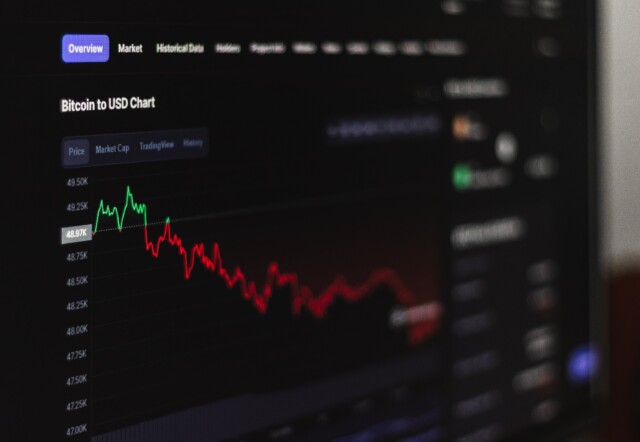To make Wealthtender free for readers, we earn money from advertisers, including financial professionals and firms that pay to be featured. This creates a conflict of interest when we favor their promotion over others. Read our editorial policy and terms of service to learn more. Wealthtender is not a client of these financial services providers.
➡️ Find a Local Advisor | 🎯 Find a Specialist Advisor

In a recent Harris Poll that asked Americans about their financial priorities, consumers ranked learning about cryptocurrency second only to the topic of retirement planning. But does your financial advisor know how to answer your crypto questions?
Fortunately, a growing number of financial advisors have earned advanced designations to demonstrate their knowledge and commitment to helping clients invest in blockchain-related investments.
If you have an interest in adding digital assets to your portfolio, consider these tips to find a financial advisor who understands the opportunities and risks of investing in cryptocurrencies to help you make more informed decisions with your money.
How to Find a Crypto Financial Advisor
Advisors who can help you build a portfolio of stocks, bonds, mutual funds, and ETFs are commonplace. However, when it comes to digital assets such as cryptocurrencies and non-fungible tokens (NFTs), finding advisors with relevant credentials and knowledge can be challenging.
A referral from a friend already working with a knowledgeable advisor could be helpful, or consider using the Wealthtender directory of crypto financial advisors to begin your search online. Many financial advisors can meet with you online, so you can expand your search to include advisors nationwide.
Before engaging with a financial advisor, it’s worth drawing up a few open-ended questions that will help you get a feel of whether there will be a fit between yourself and the advisor.
One good opening question to the advisor could be to ask their thoughts on whether cryptocurrencies are an investment vehicle in their own right. The response will give a good indication of how the rest of the conversation will go.
Nathan Mueller, MBA, founder of BlackBird Finance, said that in his experience, mentioning crypto to many financial advisors is like “nails on a chalkboard.” However, for Nathan and other advisors, it can be a welcome question from a client. It’s important to establish whether there will be common ground between the client and their financial objectives and the advisor.

Crypto Investing Questions to Ask Your Financial Advisor
Based on the answer to the first question, the conversation could end abruptly or, potentially, be the seed for a good relationship. If the signs are positive, you will want to ask additional questions. Here are a few to consider.
Do you have any cryptocurrency holdings in your portfolio?
A good follow-up question is whether the advisor has invested in crypto personally. An advisor interested in the crypto space is one thing, but it could be a red flag if they’re unwilling to put their own money at risk. Finding an advisor who is walking the talk with their own money on the line could be a way of validating whether they believe what they’re saying.
What crypto credentials have you earned?
Two credentials to look for in an advisor are the Certified Digital Asset Advisor (CDAA) and Certificate in Blockchain and Digital Assets (CBDA). These relatively new qualifications cover several of the critical aspects of the asset class, including blockchain technology and decentralized finance. The qualifications give investors assurance that the advisor has a high level of knowledge of cryptocurrency and can speak with authority.
However, for advisors, the qualifications aren’t obligatory, and as Nathan Mueller says,
“For me since I like crypto but don’t have the training behind me and being held to a fiduciary standard, I will talk about the basics of crypto with the clients, how it can play an overall role in their portfolio, and the associated risks. However, I will let them know they need to work with an advisor who is specifically trained in this area if they want recommendations on which cryptos to buy, hold, and sell.”
Are you helping any other clients with their crypto investments?
By this point, there’s a good chance there may be a fit and the start of a good working relationship. But before getting too ahead of yourself, you might want to find out whether you would be the only crypto client the advisor is working with or one of many.
There’s an argument in favor of being the only client – the advisor is wholly focused on you. However, if you’re one of a few crypto clients with a seasoned financial advisor, many of the detailed, technical questions you have, are likely to have already been asked. You should expect substance in what they say rather than something that pads out a light answer.
Should I invest directly in cryptocurrencies or use investment vehicles like an ETF or IRA for exposure?
As you might have guessed, a client should ask this question once an advisor/client agreement is in place. It’s a reasonable question since while numerous exchanges provide a direct route to ownership of cryptocurrencies, there are also several alternative indirect ownership methods.
A knowledgeable advisor with the proper credentials can advise on the pros and cons. The ProShares Bitcoin ETF, Grayscale Trust, and CME Bitcoin Futures are examples of alternatives; the latter is a leverage instrument that brings added implications for risk.
And a financial advisor who knows the ins and outs of cryptocurrencies can also help ensure you don’t fall victim to crypto scams.
What are the tax implications of holding cryptocurrency directly?
One other relevant question considers the tax implications of both direct and indirect ownership of cryptocurrencies. Working with a financial advisor has the advantage of providing you with the benefits and drawbacks of each investment option and how they will affect your taxes.
You’ll probably find dozens of financial advisors in your area that can help you attain your financial objectives with a customized strategy. However, finding a financial advisor who is comfortable working with cryptocurrency may be more challenging.
Hopefully, these questions will help you identify a financial advisor who understands digital assets and can help you incorporate blockchain-related investments into your portfolio.
Source: Harris Poll: 2022 Wealth and Wellness Index (PDF)
Are you ready to enjoy life more with less money stress?
Sign up to receive weekly insights from Wealthtender with useful money tips and fresh ideas to help you achieve your financial goals.

About the Author
Tim Thomas
Tim Thomas helps traders and investors reach their financial objectives.
To make Wealthtender free for readers, we earn money from advertisers, including financial professionals and firms that pay to be featured. This creates a conflict of interest when we favor their promotion over others. Read our editorial policy and terms of service to learn more. Wealthtender is not a client of these financial services providers.
➡️ Find a Local Advisor | 🎯 Find a Specialist Advisor







